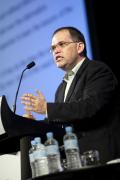This project considered whether conflicting legal requirements, and fear of litigation, may impede decision making in emergency management. It identified the true impact of law upon fire management and community resilience. It also asked:
What are the objectives of emergency management policy? And what are, or should be, the measures of success that will inform the community, agencies and the next post-event inquiry?
Professor Stephen Dovers, at the Australian National University, led the project, researched by Dr Michael Eburn.
It was hyphothesised that 'mainstreaming', or incorporating fire and emergency management considerations in other policy sectors, would improve policy responses before, during and after major fire events.
Also reviewed were the findings of post-event inquiries, judicial decisions and insurance claims to identify how law is applied to the fire ground and to determine if legal principles are an impediment to effective fire management.
The study showed that Australian emergency management policy suffers from a lack of clear objectives or measures of success. This means that agencies, governments and citizens cannot identify whether or not policy objectives are being met and whether the emergency services are succeeding in their tasks.
It also concluded that governments need to demonstrate leadership and begin the discussion on the reality that living in the Australian bush is not, and never will be, risk free. To reduce that risk will involve costs, and the community has to be engaged on the price they are willing to pay and the degree of risk they will accept.
Mainstreaming of emergency management does occur but its strength is unclear and contestable. The research identified that litigation is not a significant threat to the emergency services. Fire and emergency management could benefit from the fine-tuning of laws but this could be done by government departments. The most important changes needed concern the way events are reviewed, in order to move away from blame, retribution and the narrative that disasters are caused by a weak link in the preparation for, or response to the event, rather than by the overwhelming nature of the event itself.
The research should form the basis for honest and open discussion between governments, fire and emergency services and the community about what can reasonably be expected and what are the true limitations of emergency management. Clear statements of intention and success should also assist in the next inquiry, giving the coroner or commissioner some standard by which to measure the performance of the emergency services.
Two students contributed to this project. Deakin University PhD researcher Rachel Carter examined how Australian insurance law and regulatory systems covered property damage caused by fire. She identified the factors that prevented people from taking out insurance and the legal and regulatory barriers to obtaining reasonably priced insurance.
Peter Wieske of ANU focused his PhD on the history, present shape and future possibilities of ‘Complex Unbounded Problems’, or major disruptive events of a natural, political, economic, technological or military origin. The main area of investigation has been into community expectations and outcomes of policy and planning decisions in emergency response to disasters. Among his findings, he has identified commonalities between the different disasters, whether natural or man-made, and the pre-conditions that compound these disasters.















